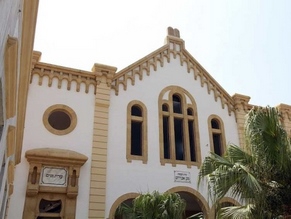|
World Jewish News

Beirut synagogue is restored to glory - August 3, 2010. Photo by: Reuters
|
Beirut synagogue restored to glory, despite tensions with Israel
18.08.2010, Jews and Society The renovation of the Maghen Abraham Synagogue in downtown Beirut is nearing completion. Artists have been putting the finishing touches on the interior of the temple sanctuary, which was constructed in 1925 in the Wadi abu-Jmil district of the city, also home to the country's parliament buildings.
Renovations on the ruined synagogue in central Beirut began in 2009 after an agreement between various religious denominations and permission from the Lebanese government, planning authorities and even Hezbollah. The project received the green light after political officials and community leaders became convinced it could show that Lebanon is an open country, tolerant of many faiths including Judaism.
Renovations have included mending the gaping hole in the Moroccan-style synagogue's roof and repairing the chandeliers that once hung from it. The Torah ark and prayer benches will also be refurbished to their former states, having been seriously damaged in fighting between Muslim and Christian forces during the 1975-1990 Lebanese civil war.
Several dozen Jews still living in Lebanon will fund the project to the tune of $200,000, along with others in the Diaspora. The project has also received a $150,000 grant from Solidere, a construction firm tasked with rebuilding central Beirut from the destruction of the civil war. The company is privately owned by the family of Rafik Hariri, the former prime minister assassinated in 2005.
Lebanon's Jewish community is one of the country's 17 officially recognized faiths. Over the years the Lebanese Jewish community has dwindled due to emigration, including to Israel. The several dozen people in its remaining Jewish community hold few religious activities other than prayer services during the High Holidays. Many Jewish residents are in middle age or older, and affluent, and many live outside Lebanon, mostly in Europe.
Haaretz.com
|
|
